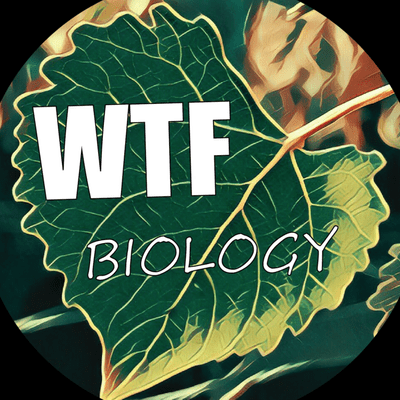
WTF, Biology?
Podcast von WTF Biology
Nimm diesen Podcast mit

Mehr als 1 Million Hörer*innen
Du wirst Podimo lieben und damit bist du nicht allein
Mit 4,7 Sternen im App Store bewertet
Alle Folgen
19 FolgenIn this bonus episode, I discuss some of my favorite co-evolved plant-pollinator relationships. I also include a portion of my conversation with Dr. Lindsie McCabe that ended up on the cutting room floor for last week's full episode. You can learn more about Lindsie and her research by visiting her website https://twitter.com/Lindsie_McCabe [https://twitter.com/Lindsie_McCabe]. You can also find her on Twitter @Lindsie_McCabe [https://twitter.com/Lindsie_McCabe] If you're interested in participating in citizen science, you can check out iNaturalist [https://www.inaturalist.org/], and/or bumblebeewatch.org [https://www.bumblebeewatch.org/] As always, music for the show is by Dr. Ron Deckert. Find his music at soundcloud.com/ron-deckert [//soundcloud.com/ron-deckert].
In celebration of #NationalPollinatorsMonth, my guest and I talk about the lesser known and under-appreciated pollinators--native bees and flies. I am joined by Dr. Lindsie McCabe, an entomologist with the U.S. Department of Agriculture Pollinating Insect-Biology, Management, Systematics Research [https://www.ars.usda.gov/pacific-west-area/logan-ut/pollinating-insect-biology-management-systematics-research/] lab, otherwise known as the bee lab. Check out more on how to make your garden bee friendly here: https://nationaldaycalendar.com/national-pollinators-month-june/#:~:text=National%20Pollinators%20Month%20in%20June,bats%2C%20and%20other%20natural%20pollinators. [https://nationaldaycalendar.com/national-pollinators-month-june/#:~:text=National%20Pollinators%20Month%20in%20June,bats%2C%20and%20other%20natural%20pollinators.] You can learn more about Lindsie and her research on her website lindsiemccabe.wordpress.com [https://lindsiemccabe.wordpress.com/]. You can follow her on Twitter @lindsie_mccabe for awesome bee and other pollinator related science. The citizen science resources we mentioned are here: https://www.bumblebeewatch.org/ [https://www.bumblebeewatch.org/] https://www.inaturalist.org/ [https://www.inaturalist.org/] https://beespotter.org/ [https://beespotter.org/] Follow WTF Biology on Facebook, Instagram, Twitter and/or TikTok @wtf_biology. Music for the show is by Dr. Ron Deckert. Find him at soundcloud.com/ron-deckert [//soundcloud.com/ron-deckert]
Deserts are extreme places bouncing between too hot and too cold; too dry and too wet. But moss have found a way to buffer those extremes. Join Dr. Jenna Ekwealor and I as we discuss the strange lifestyle of hypolithic moss, namely moss that live underneath rocks. You can learn more about desert mosses at https://3dmoss.berkeley.edu/ [https://3dmoss.berkeley.edu/] Check out Jenna's hero scientists here: https://www.esf.edu/faculty/kimmerer/ [https://www.esf.edu/faculty/kimmerer/ ]https://www.calstatela.edu/faculty/kirsten-fisher [https://www.calstatela.edu/faculty/kirsten-fisher] Listen to Dr. Ron Deckert's music on soundcloud.com/ron-deckert [//soundcloud.com/ron-deckert]. This week's song is Green Rain. Follow me on Facebook, Instagram, Twitter, and TikTok @wtf_biology in all the places.
In the United States, May is #NationalWildfireAwarenessMonth. To kick off this month, I welcome Dr. Mike Remke back to the show to discuss wildfire's past, present, and future. Check out this article of the Yurok tribe's use of wildfire: https://www.theguardian.com/us-news/2019/nov/21/wildfire-prescribed-burns-california-native-americans [https://www.theguardian.com/us-news/2019/nov/21/wildfire-prescribed-burns-california-native-americans] Find the wildfire information for your location here: https://www.ready.gov/wildfires [https://www.ready.gov/wildfires] Wildfire Adaptive Partnership information is here: https://www.wildfireadapted.org/ [https://www.wildfireadapted.org/ ] Check out Mike's personal website here: https://www.mycoremke.com/ [https://www.mycoremke.com/] Music is by Dr. Ron Deckert and you can find this song (Pondo Funk) and all his other songs at www.soundcloud.com/ron-deckert [//www.soundcloud.com/ron-deckert] You can support WTF Biology at https://www.patreon.com/wtfbiology [https://www.patreon.com/wtfbiology]. Follow me on Facebook, Instagram, Twitter, and TikTok. I'm @wtf_biolgoy in all of those places.
Western North American landscapes are driven by ecological disturbances. That might mean wildfire, insect outbreaks, or gophers. In the Colorado River and other western North American streams, that means droughts and floods. The trouble happens when humans come along and build dams that prevent those disturbances from happening. My guest today is Dr. Dave Lytle, a Professor of Evolution and Ecology at Oregon State University who uses western North American rivers as a laboratory to understand how disturbances drive the ecology and evolution of aquatic invertebrates. Learn more about Dr. Dave Lytle by going to his website here: https://lytlelab.science.oregonstate.edu/ You can follow me on Facebook, Instagram, Twitter, and TikTok @wtf_biology Music is by Dr. Ron Deckert. This song is called 'Red Rock, Blue Skies'. Listen to this song and all Ron's other songs at soundcloud.com/ron-deckert























